Biography
Interests
Maram Osman Elawad Mabyoue1*, Omer Awadelkarim Omer Ibrahim1 & Elamin Yassin Elsamani Alamelhuda2
1Faculty of Medicine, University of Khartoum, Khartoum, Sudan
2Sudan Medical Specialization Board, Sudan
*Correspondence to: Dr. Maram Osman Elawad Mabyoue, Faculty of Medicine, University of Khartoum, Khartoum, Sudan.
Copyright © 2021 Dr. Maram Osman Elawad Mabyoue, et al. This is an open access article distributed under the Creative Commons Attribution License, which permits unrestricted use, distribution, and reproduction in any medium, provided the original work is properly cited.
Abstract
The novel corona virus COVID-19 is the seventh of genetically related corona viruses known
to infect humans and the third with epidemic potentials after SARS-CoV and MERS-CoV. It
usually presents as a respiratory infection with fever, cough, generalized body aches and sometimes
can be complicated by respiratory failure or multisystem failure. It has emerged as a pneumonia of
unknown cause in Wuhan, China in December 2019. Shortly it spread to all continents and most
countries with 5.1 million confirmed cases and 332,876 deaths worldwide. At the time of writing
in Sudan, a sub-Saharan African country, there were 3,138 confirmed cases and 121 deaths.
This was a cross sectional community based online survey aimed to assess knowledge, attitudes and
practices toward COVID-19 among public in Sudan. A total of 403 participants were enrolled
from different states of Sudan.
Among the participants (n=403), 55.1% were males, 63.3% aged 20-29 years, 33.4% held a
university degree or above, and 50.6% were of non-medical professions. The participents’ mean
knowledge score was (8.56/10=85%), mean attitudes and practices scores were found to be
(9.92/13=76.30%) and (8.40/11=76.36%) respectively. Scores of knowledge, attitudes and practices
correlated positively with education and employment.
The participants showed very good knowledge regarding transmission, symptomatology and
prevention of the virus, with acceptable overall attitudes and practices. More studies with larger
samples are needed to explore practice patterns and to identify factors preventing the public from
adherence to health recommendations. Extensive utilization of different media as well as community
compaigns are important to deliver correct and sound health information especially to vulnerable
communities.
Introduction
Since its emergence as a pneumonia of unknown cause first detected in Wuhan, Hubei province, China in
December 2019, the novel corona virus (SARS-CoV-2) continued spreading and was soon declared by the
WHO as a Public health emergency of international concern on January 31st 2020 [1].
It is the third of genetically related corona viruses with epidemic potentials to be identified in the past two decades, SARS-CoV and MERS-CoV detected in 2002 and 2012 respectively [2,3].
The novel corona virus infection (now officially named COVID-19) may present as cough with fever, shortness of breath and in severe cases it can cause respiratory failure as well as multisystem failure. Although it showed lower case fatality rates than previous corona viruses, it’s rapid communicability makes it no less dangerous and this entails more collaborative efforts to halt its transmission [4].
Novelty of the virus, its contagiousness and lack of specific treatment have created an unprecedented Global state of emergency, with countries around the globe taking drastic measures to prevent, contain and treat infections.
Despite all global efforts COVID-19 infections continued propagating crossing borders of countries and continents. At the time of writing according to johns Hopkins university coronavirus resource center, the confirmed COVID-19 cases were 5.1 million worldwide with a rising death toll of 332,876 distributed over 188 countries and regions [5].
In Africa, the first case was reported in Egypt with abrupt increase to involve many other African countries resulting in 96,829 confirmed cases and 3,031 deaths [6].
As of May 22nd the situation in Sudan was 3,138 confirmed cases with 121 deaths [5].
The head of Africa Centers for disease control stated that African countries are especially vulnerable to
disastrous outcomes due to the corona pandemic [7].
About 41 African countries constituting 87% of the continent had experienced at least one epidemic, while 21 countries (45%) had at least one outbreak annually [2].
Together with sociopolitical instability, poverty and weak health care systems African countries are at risk of deleterious effects of the virus both on economy and lives.
Sudan as an African country is no exception for the vulnerability to the pandemic effects. Social distancing,
early detection, isolation of cases and cases management remain the first-line measures for African countries
and Sudan in particular; as their health systems can’t deal with cases on large scales.
All above mentioned measures are largely dependent on the public knowledge, attitudes and practices toward the pandemic to facilitate early reporting of cases, personal preventive measures and knowledge driven positive attitudes and practices. That’s why this study is so important to provide an insight about the public current standpoint in those areas as no other study so far has addressed this topic in Sudan.
This study aims to assess public knowledge, attitudes and practices toward COVID-19 Pandemic in
Sudan, which may give policymakers clues about the current public standpoint and unveil areas needing
interventions.
Methods and Materials
This is a descriptive cross-sectional study on Sudanese public aging 18 years and above in the period from
April 22nd to May 1st 2020.
The sample size was calculated to be 384 with 95% confidence interval and 0.05 maximum tolerable error.
A convenient sample was taken using a structured, online questionnaire.
The authors ensured posting the questionnaire using Google forms across different internet and social media platforms so that sample is demographically inclusive to all regions of Sudan.
The questionnaire was formed based on previous papers addressing the same topic in other countries like china with some modifications to ensure reasonable length and informativity [4,8].
It composed of 25 questions. Six questions were socio-demographic questions and one question about the sources of participants’ information. A total of ten questions were assigned to address the knowledge about COVID-19 pandemic: four questions on clinical presentation, two on transmission of the virus and four questions on prevention, control and treatment. Regarding attitudes and practices four questions were assigned for each.
A computerized statistical package for the social sciences (SPSS) software version 26 was used for data entry
and analysis.
Descriptive statistics and frequency tables were used to describe the demographic data.
Answers to the questions were given numerical values to allow scoring of knowledge, attitudes and practices, to perform one way analysis of variance (one-way ANOVA) and calculate Pearson correlation coefficient in order to describe relations of demographic independent variables to scores of knowledge, attitudes and practices.
Participants were implicitly consented by voluntary filling of the questionnaires and were reassured about
anonymity of their responses.
Results and Discussion
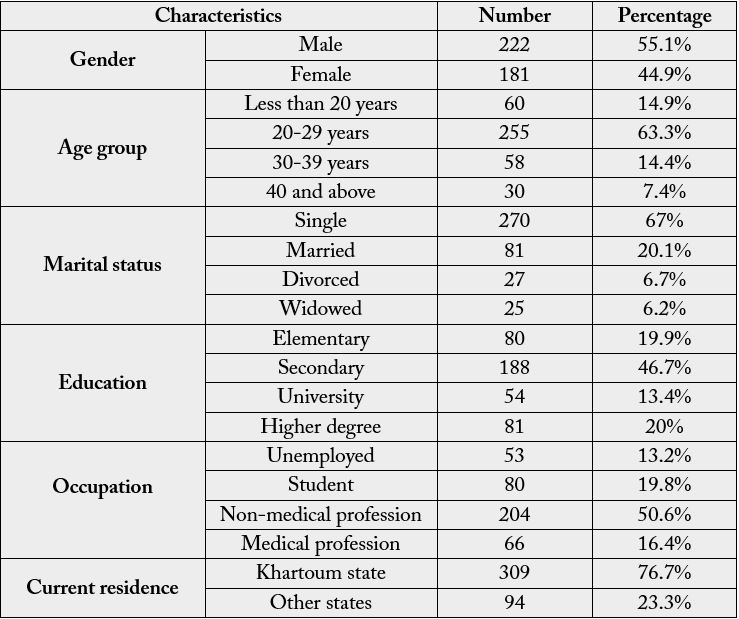
The total number of participants in this study were 403 with 76.7% residing in Khartoum. Male participants outnumbered females, 55.1% vs. 44.9% respectively.
63.3% aged 20-29 years, mostly single 67%. Nearly half (46.7%) had secondary school degrees, 13.4% university degrees and 20% higher educational degrees.
Half of participants (50.6%) were of non-medical professions with 13.2% of all participants unemployed.
Social media was the most frequently reported source of information about COVID-19 followed by Television, official updates from WHO and ministries of health respectively.
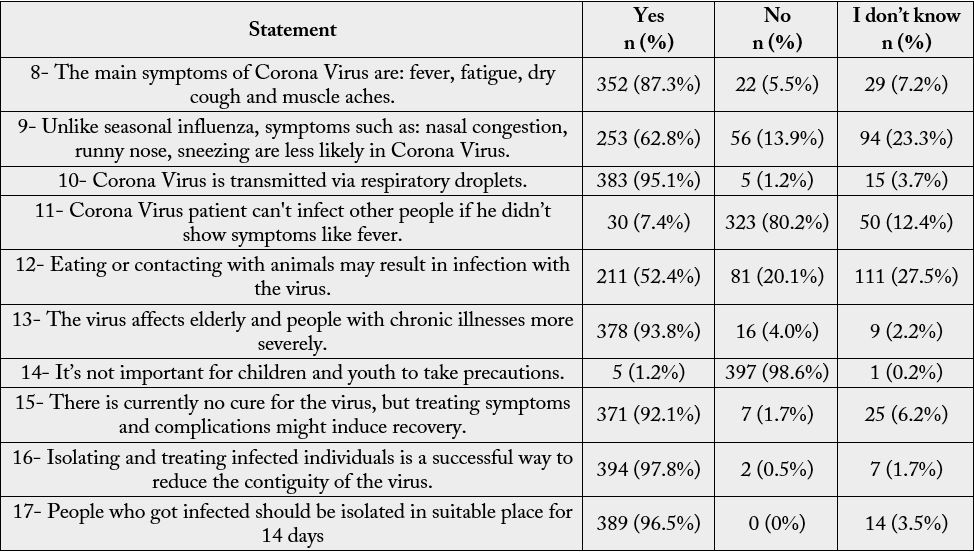
As shown in table 2, the majority of participants had very good knowledge about symptomatology of the virus with 62.8% recognized that nasal congestion, runny nose and sneezing were less common with COVID-19 compared to the seasonal influenza. Almost all participants knew how the virus spread with 80.2% identified asymptomatic carriers as potential sources of infection which is a vital piece of information for prevention.
About half of participants reported that handling or eating of animals might be a way of contracting COVID-19 which is acceptable as researches are still going on to determine the origin of the virus confidently [3].
The participants acknowledged seriousness of the infection on elderly and those with chronic medical conditions. They recognized there was no specific cure so far for the virus and supported isolation of confirmed or suspected cases to prevent spread and to provide symptomatic management as with previous corona viruses [8].
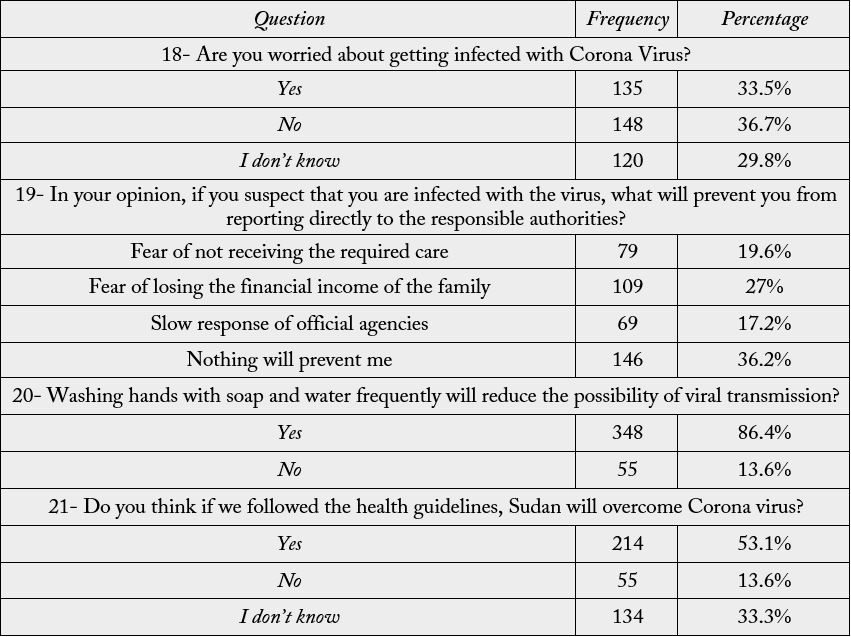
As shown in table 3, only 33.5% of participant reported they were worried about getting the infection, this low percentage may reflect the relatively high spirituality in the Sudanese population taking such events as tests from the creator or they may be more worried about the outcomes of the epidemic more than the infection itself on their living situations.
Authors intended to explore the factors that may prevent individuals from reporting themselves when infected and as expected fear of losing financial income ranked at top followed by concerns of inadequate health care provision and slow response of official bodies. These three factors must be considered and dealt with appropriately to facilitate rapid reporting of cases and gain the public trust.
The participants agreed that frequent simple hand-washing with soap and water will reduce the transmission. Unsurprisingly only 53.1% believed that Sudan will overcome this pandemic probably because they have witnessed developed countries with excellent health systems failing to control the infections and their citizens succumbing to the virus in large numbers [9].
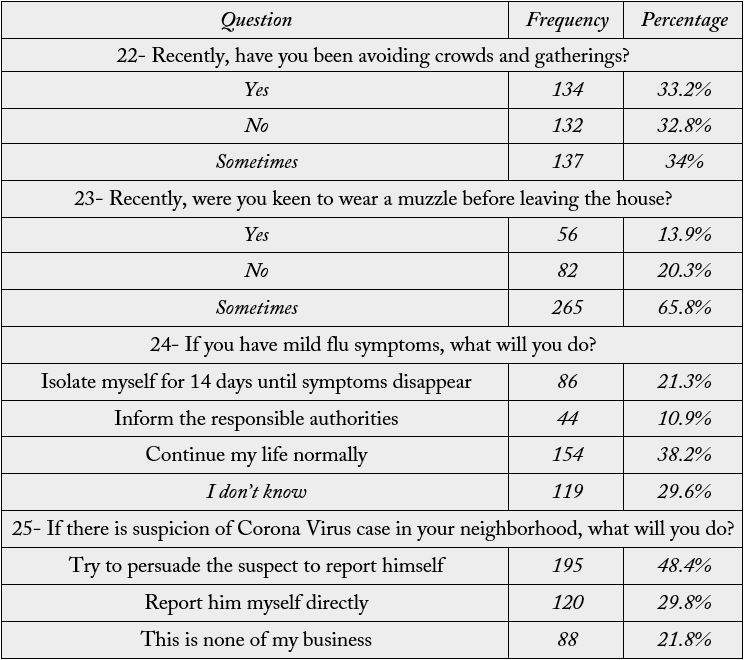
As demonstrated in table 4, 33.2% have been consistently avoiding crowded places and 34% have been so sometimes while 32.8% stated lack of avoidance for crowded places. This apparently dangerous trend may be due to incompliance with health advices for different reasons or may reflect some occupations in which it’s difficult to avoid crowded places or it’s a continuation of difficulties with social distancing facing African countries which has 80% of its labor force informal with no alternative source of income if stopped working [10].
Relatively few participants wore face masks when leaving houses this might be explained by the severe shortage in face-masks and personal protective equipments globally and the prices surge [11].
Majority of participants showed positive practice toward reporting suspected cases of corona virus.
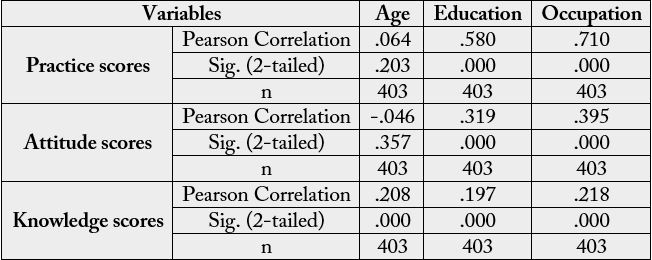
Table 5 shows positive linear relationship between variables of education and occupation with scores of knowledge, attitudes and practice. When combined with table 6 showings mean scores of participants we conclude that scores of knowledge attitudes and practices increases with education and employment. The same applies to knowledge scores with age.

The cutoff point between good and bad score for knowledge, attitudes and practices was chosen to be 70% based on previous similar papers and classification of questions based on difficulty for non-medical personals [3,12].
The mean overall scores for knowledge was very good 8.56/10 (85%), however mean scores of attitudes and practices were 9.92/13(76.3%) and 8.4/11(76.36%) respectively.
Limitations and Weaknesses of the Study
1. Limitations to internet access lead to underrepresentation of vulnerable groups and elderly who might
have poor knowledge, bad practices and negative attitudes
2. Unstandardized questionnaire and convenient sampling were used due to timely constraints, novelty of
the virus and infeasibility of focused group discussions due to the lockdown and curfew.
Conclusion and Recommendations
• The participants showed very good knowledge regarding transmission, symptomatology and prevention of
the virus, with acceptable overall attitudes and practices.
• Scores of knowledge, attitudes and practices correlate positively with education and employment.
• More studies with larger samples are needed to explore practice patterns and to identify factors preventing
the public from adherence to health recommendations.
• Extensive utilization of different media as well as community compaigns are important to deliver correct
and sound health information especially to vulnerable communities.
Competing Interests
None to declare.
Authors’ Contributions
All authors contributed to the design, execution of the study, data analysis and were actively involved in
writing. They all read and approved the final manuscript.
Acknowledgement
Authors are grateful to all participants in this study.
Bibliography

Hi!
We're here to answer your questions!
Send us a message via Whatsapp, and we'll reply the moment we're available!